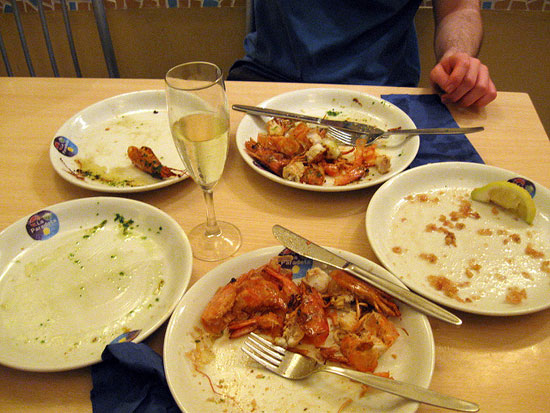Is it dangerous to eat at night? Almost everyone knows the saying ”have a king’s breakfast, have a prince lunch and have a poor dinner”, that speaks how morning meal has to be the richest, the lunch should be moderate and the dinner should be easiest. Still, the number of people that take these advises is pretty low.

The problem appears when this behavior turns into a habit and it becomes a threat to our health. Nutritionists and doctors completely agree in the degree of the danger that night meals carry, and most think that it is a serious disorder, but there are also the ones that think this is exaggerating.
They claim that the time of dinner is not important, but whether we consume more calories than we actually need. Still, experts do not recommend having nighttime meals, considering that the last meal should not be after 7 or 8 pm. The research so far has showed that the night eating syndrome is a consequence of some physical problems, and it affects 5% of the world population. NES is an acronym for “Night Eating Syndrome” and it represents overeating at night which is often accompanied by depression and general dissatisfaction.
The brain does not register the groceries we consume at night, so the wish to eat is connected to the wish for pleasure. People that do not have enough sleep have an increased wish to munch and look for a very tasty food, rich in fats and sugars. Loss of energy is a consequence of sleep deprivation, and this is how a model of eating-sleeping actions develops. When they wake up, these people are convinced that food helps them to go to sleep again. The leptin hormone which is created by fatty cells, sends a signal to the brain that we are full, but when we don’t have enough sleep the amount of this hormone decreases, and this brings up the feeling of hunger. Sleep deprivation also leads to increase in the quantity of ghrelin hormone which stimulates appetite and consequently leads to nighttime overeating. The final result is gaining weight and overall physical and mental health disorder.
Ghrelin as a hunger hormone quickly accumulates and if we skip meals, especially the breakfast, if we eat foods low in calories (consequence of exhausting diets), or we have intensive work out every day for a few hours. That is why it is most important to regularly take our meals. Food high in calories is recommended for breakfast, for a good balance of complex carbs, proteins and fats. Regular, but moderate exercise is recommended. With people that have eating disorders, family support is necessary, because they have hard time facing the problem solving and the necessary treatment, so they often go to the doctor when it is already too late.















